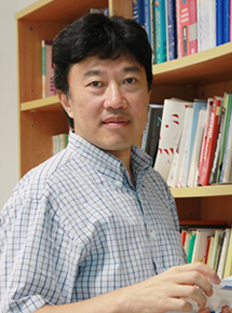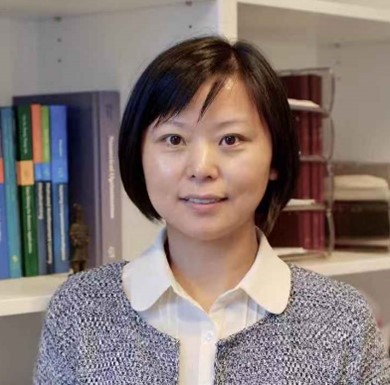Speakers
Exploring Online Social Networks: Graph Algorithms and Systems
Abstract
Online Social Networks have been widely studied over years. To better understand online social networks, graph algorithms and graph systems have played a very important rule. In this talk, we will discuss some selected research topics for online social networks from graph algorithms and systems perspectives. The topics include but not limited to community search, overlapping communities, influential community search, triangle-free densest structure, finding social hierarchy, subgraph matching and symmetric subgraph matching, finding graph features by subgraph counting, and graph/data analytics integration.
Biography
Dr Jeffrey Xu Yu is a Professor in the Department of Systems Engineering and Engineering Management, The Chinese University of Hong Kong. His current main research interests include graph algorithms, grap processing systems, and query processing in database systems. Dr. Yu served as an Information Director and a member in ACM SIGMOD executive committee (2007-2011), an associate editor of IEEE TKDE (2004-2008), and an associate editor in VLDB Journal (2007-2013). Currently he servers as an associate editor of ACM TODS, WWW Journal, Data Science and Engineering, the International Journal of Cooperative Information Systems, the Journal on Health Information Science and Systems (HISS), and Journal of Information Processing. Dr. Yu served/serves in many organization committees and program committees in international conferences/workshops including PC Co-chair of APWeb'04, WAIM'06, APWeb/WAIM'07, WISE'09, PAKDD'10, DASFAA'11, ICDM'12, NDBC'13, ADMA'14, CIKM'15, Bigcomp17, DSAA'19, CIKM'19, and DASFAA'20, and conference general Co-chair of APWeb'13, ICDM'18, and ADC'22.
Smart Medicine: Medical Big Data / AI with Innovative Applications in Patient Monitoring, Disease Diagnosis,Prediction and Health Management
Abstract
Due to the recent development or maturation of database, data storage, data capturing, and sensor technologies, huge medical and health data have been generated at hospitals and medical organizations at unprecedented speed. Those data are a very valuable resource for improving health delivery, health care and decision making and better risk analysis and diagnosis. Health care and medical service is now becoming more data-intensive and evidence-based since electronic health records are used to track individuals' and communities' health information (particularly changes). These substantially motivate and advance the emergence and the progress of data-centric health data and knowledge management research and practice.
In this talk, we will introduce several innovative data mining techniques and case studies to address the challenges encountered in e-health and medical big data. This includes techniques and development on medical data streams, correlation analysis, abnormally detection and risk predictions, including diagnosis of sleeping and mental health.
Biography
Yanchun Zhang is currently Professor at Guangzhou University. He is also Emeritus Professor at Victoria University.
Dr Zhang obtained a PhD degree in Computer Science from The University of Queensland in 1991. His research interests include databases, data mining, web services and e-health. He has published over 400 research papers in these areas, and supervised 40 PhDs and post doctors in completion. Dr. Zhang is a founding editor and editor-in-chief of World Wide Web Journal (Springer) and Health Information Science and Systems Journal (Springer). He speaks regularly at international conferences in the areas of data engineering / data science and health informatics. He has served as an expert panel member for various international funding agencies including National Natural Science Foundation of China, Australian Research Council, the Royal Society of New Zealand’s Marsden Fund, Medical Research Council of United Kingdom and NHMRC of Australia.
Balancing Privacy and Utility in Database Fragmentation
Abstract
In outsourcing data storage, privacy and utility are significant concerns. Techniques such as data encryption can protect the privacy of sensitive information but affect the efficiency of data usage accordingly. By splitting attributes of sensitive associations, database fragmentation can protect data privacy. In the meantime, data utility can be improved through grouping data of high affinity. In this paper, a benefit-driven genetic algorithm is proposed to achieve a better balance between privacy and utility for database fragmentation. To integrate useful fragmentation information in different solutions, a matching strategy is designed. Two benefit-driven operators for mutation and improvement are proposed to construct valuable fragments and rearrange elements. The experimental results show that the proposed benefit-driven genetic algorithm is competitive when compared with existing approaches in database fragmentation.
Biography
Hua is now a full time Professor in ISILC at Victoria University. Hua has more than ten years teaching and research experience in Applied Informatics at both enterprise and university. He has expertise in Big Data, Health Informatics, Cloud Computing, Cyber Security, and Artificial Intelligence. As a Chief Investigator, Hua has successfully received seven in total Australian Research Council (ARC) grants including five Discovery grants and two Linkage grants with 3.1M since 2006. Currently, Hua is holding two ARC Discovery projects and one Linkage project. He is also a successor for international grants such as two Japan - Australian grants, one German - Australian grant, one Norway Government grant and grants from Hong Kong Chinese University, Hong Kong City University.
Hua has published 300+ refereed scholar papers including 81 Q1 (ERA2018 ranked) Journal papers in cyber security, Artificial Intelligence, data mining, database, privacy preserving and Web services. Representative publications are 3 ACM Transactions and 29 IEE Transactions such as ACM Transactions on Internet Technology, ACM Transactions on Information Systems, ACM Transactions on Knowledge Discovery from Data, IEEE Transactions on Dependable and Secure Computing, IEEE Transactions on Knowledge and Data Engineering, IEEE Transactions on Evolutionary Computation and IEEE Transactions on Automation Science and Engineering; and Proceedings of ACL, AAAI, CIKM, ICDE, ICDM and PAKDD (https://scholar.google.com.au/citations?user=U7B_FmYAAAAJ&hl=en). Hua's research impact is increasing in recent years, his work has been cited 8000+ times with h-index 51 based on Google Scholar website. As a principal supervisor, he currently has 14 PhD students and has successfully supervised 18 research students at VU.
Hua is appointed as a College of Expert by the ARC, and has been an ARC reviewer since 2009. He reviews many proposals each year for various proposals such as ARC DP, LP, DECRA, LIEF. Hua is awarded as a senior IEEE member and the Editor-in-Chief, ICST Transaction on Scalable Information Systems, and also editor for PLOS ONE (Q1), Health Information Science and Systems (Q1) and World Wide Web Journal - Springer (Q2). He has involved in many prestigious international conferences such as PC members (AAAI, DASFFA) and chairs (WISE, HIS).
Machine Learning for Interactive Systems
Abstract
Recent years have witnessed increasing research interests in designing modern interactive systems and intelligent agents with the machine learning techniques. In this talk, we will first review some typical machine learning tasks & solutions about the interactive systems, such as the Vision-and-Language Navigation, Embodied Question Answering, Website Navigation and Robotics Manipulation tasks. Then, we will focus on how to design effective game AI in the Text-based Games, which provides a safe and interactive test-bed for language learning and reinforcement learning. This talk also discusses the future trends of the ML-based interactive systems, such as how to address the generalization challenges in interactive systems, and how to design human-centered interactive systems.
Biography
Ling Chen is a Professor with the Australian Artificial Intelligence Institute (AAII), University of Technology Sydney. Her recent research interests focus on developing machine learning models and algorithms for interactive computing systems, where the interactions involve humans, the environment, and/or other computing systems. Related machine learning techniques include (multimodal) representation learning, reinforcement learning, and continuing learning etc. Dr Chen’s research has been recognised by the industry, such as Meta (previously Facebook) and TPG Telecom, with multiple grants and projects. Her papers appear in major conferences and journals including IEEE TNNLS and NeurIPS. She is an editorial member of the Data and Knowledge Engineering journal. She currently serves as a member of College of Experts for Australian Research Council.



